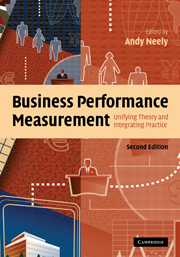Book contents
- Frontmatter
- Contents
- List of figures
- List of tables
- List of boxes
- List of contributors
- Introduction
- Part I Performance measurement – functional analyses and theoretical foundations
- 1 Accounting performance measurement: a review of its purposes and practices
- 2 Measuring marketing performance: research, practice and challenges
- 3 Measuring performance: the operations management perspective
- 4 Measuring performance: the supply chain management perspective
- 5 Finding performance: the new discipline in management
- 6 A conceptual and operational delineation of performance
- Part II Performance measurement – frameworks and methodologies
- Part III Performance measurement – practicalities and challenges
- Part IV Performance measurement in public services
- Part V Performance measurement – emerging issues and enduring questions
- Index
- References
5 - Finding performance: the new discipline in management
Published online by Cambridge University Press: 22 September 2009
- Frontmatter
- Contents
- List of figures
- List of tables
- List of boxes
- List of contributors
- Introduction
- Part I Performance measurement – functional analyses and theoretical foundations
- 1 Accounting performance measurement: a review of its purposes and practices
- 2 Measuring marketing performance: research, practice and challenges
- 3 Measuring performance: the operations management perspective
- 4 Measuring performance: the supply chain management perspective
- 5 Finding performance: the new discipline in management
- 6 A conceptual and operational delineation of performance
- Part II Performance measurement – frameworks and methodologies
- Part III Performance measurement – practicalities and challenges
- Part IV Performance measurement in public services
- Part V Performance measurement – emerging issues and enduring questions
- Index
- References
Summary
Introduction
Performance is not an easy subject. There is a clear need to study and rethink what is meant by the performance of the firm and how to measure it. Performance has become the mantra of recent years. Many firms claim to be running for performance and seek to measure their performance, improve performance and compensate their people for performance. Yet, at the same time, there is widespread dissatisfaction with most performance measurement systems. Many firms, perhaps the majority, feel that they have not got it right. A 1995 article in Chief Financial Officer begins: “According to a recent survey, 80 percent of large American companies want to change their performance measurement systems …” The high level of dissatisfaction is sometimes attributed to the dearth of non-financial predictors of financial performance: “Yesterday's accounting results say nothing about the factors that actually help grow market share and profits – things like customer service innovation, R&D effectiveness, the percent of first-time quality, and employee development” (Birchard, 1995). At the same time, controllers cite the burdens imposed by “newfangled performance measures” – read non-financial measures – as a key source of burnout, according to another article in Chief Financial Officer (Goff, 1995). Reports such as these, though anecdotal, suggest that executives are seeking measures that their controllers have so far been reluctant to deliver, leading to frustration on both sides.
- Type
- Chapter
- Information
- Business Performance MeasurementUnifying Theory and Integrating Practice, pp. 113 - 124Publisher: Cambridge University PressPrint publication year: 2007
References
- 3
- Cited by

